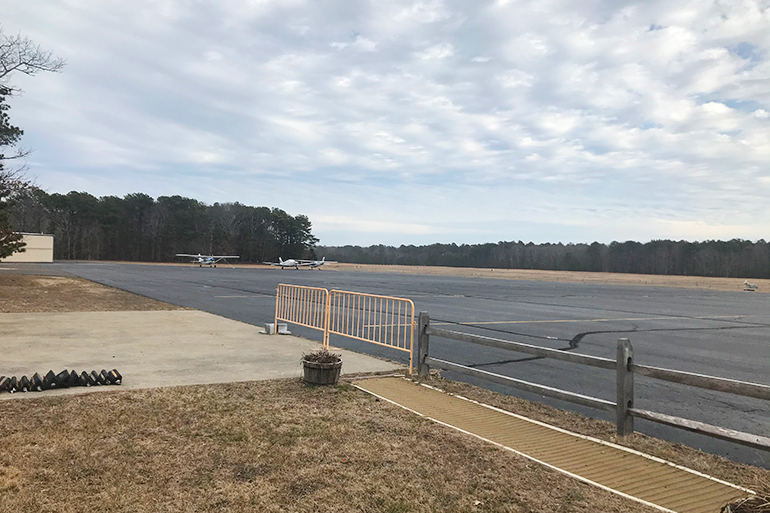Where's the Noise? East Hampton Airport Silence Upsets Neighbors

Since the start of the coronavirus emergency, the number of aircraft coming into and out of East Hampton Airport has dramatically declined. This has created an unforeseen problem for residents living in homes near the airport. For years and years, they have protested about the noise emanating from these aircraft. Not only is nothing ever done about it, but every year there’s more and more of it. Now, suddenly, all this is gone.
“My husband is quite upset,” Mrs. Brenda Carmichael, who lives on Wainscott Beach Road, said about the situation. “He just sits in his chair and stares at the wall all day. His whole adult life he’s been filing 50 or more noise complaints every day. There’s an 800 number. He’s gotten so used to hearing the noise and making the call that now he thinks his life is over.”
She said her son Chuck, who is now 15, has lived his whole life under the noise and he too is now upset about it.
“Where did the noise go?” she said. “He asks this all the time. And he says the silence is giving him ringing in his ears. My husband gets it, too.”
Many residents now run out onto their lawns to look up whenever a plane comes thundering through, low overhead. They cheer for it. This only happens a few times a day.
In fact, that’s exactly what happened when we were talking to Mrs. Carmichael on Monday. Suddenly the sound of an aircraft overhead shook the house. Chuck ran out, shouted encouragement and jumped up and down. Their dog, Wolfie, ran out with him and sat there, wagging his tail.
“It was a Sikorsky S-76 helicopter,” Chuck said breathlessly when the it disappeared out of sight. He returned inside.
As a result of all this, the Wainscott Citizen’s Committee this past Wednesday considered the matter at their weekly meeting at the Wainscott Community House.
Most people who spoke did so by shouting, since that’s been how people communicated with one another until this past March. Scott Arnold, who headed up the meeting, kept banging his gavel and asking all the speakers to lower their voices. However, shouting had become such a habit over the years, few were able to do so.
“What’s the Airport Manager doing about it?” one citizen wanted to know.
“Nothing,” Mr. Arnold said. “But he’s as upset as we are.”

A number of proposals were put forward. One was to buy 10,000 gasoline-powered leaf blowers, place them along the airport runways and have them started in unison every 12 minutes. But that got little support. There were three other proposals that never got off the ground, but then there was the proposal that the federal government be asked to use some of the Economic Disaster Assistance trillions to pay to keep planes and choppers coming.
“That would be good for Boeing,” said Charles McCarthy, one of the newer residents.
He was hooted down.
“Boeing makes only commercial planes. The problem is with private jets and helicopters. Mitsubishis, Lears and Gulfstreams,” said Bob Jones.

There was talk that if the planes had to keep coming, it might irritate the rich people to learn that they’d be required to use these aircraft even when they didn’t want to, and people agreed that was a concern.
In the end, however, the proposal to go after the federal money was approved unanimously by voice vote, and the following morning the forms for $180 million of the PPP and the EIPI money were filled out and sent off to Washington. Here is that request.
“The Wainscott Citizen’s Council requests $80 million be used to purchase two private aircraft, a Bell J-214 helicopter and a Lear 24 corporate jet plane, reportedly the country’s noisiest, and have both based permanently at the East Hampton Airport. An additional $100 million is requested to pay for the salaries of three shifts of pilots, co-pilots and navigators, together with the necessary aircraft fuel, flight attendants and landing fees to have these aircraft continuously take off, circle around and land again in what is known as ‘touch and go’ operations 24 hours a day, 7 days a week and 12 months a year.”
The immediate response from the government was favorable. The money should be made available by the end of the week.





